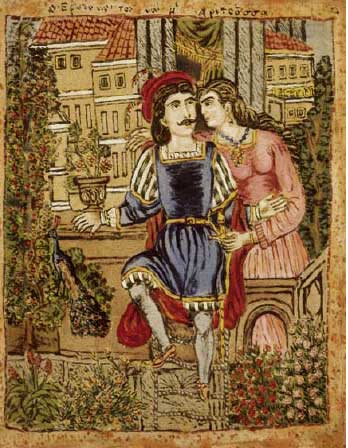|
|
Theophilos Hadjimichail, Erotokritos and Aretousa , c. 1930 Its themes are love, honour, friendship and courage. It is written in the Cretan dialect of the Greek language. A particular type of rhyming used in the traditional mantinades was also the one used in Erotokritos. The direct model of the work is the French popular medieval romance Paris et Vienne composed by Pierre de la Cypède, that was printed in 1487 and was widely diffused, as it was translated in many European languages. Erotokritos and Erophile by Georgios Hortatzis constitute the classic examples of Greek Renaissance literature. It remains a popular work until today, largely due to the music that accompanies it when it is publicly recited. Several groups of renowned Cretan musicians have added selected parts of the poem to their music, often exploring the boundaries of their local musical tradition. Vitsentzos Kornaros is considered to be the greatest of all the Cretan poets and one of the most significant and influential figures in the entire course of Greek poetry. The son of a Venetian-Cretan aristocrat and a scion of the noble Venetian family of Cornaro, he was born near Sitia, Crete in 1553. Later, when he married, he came to live in Candia (now Heraklion) where he joined the Accademia dei Stravaganti. Kornaros died in 1617, thus he is an exact contemporary of William Shakespeare. Erotokritos sets great store by true love, friendship, courage, and patriotism, and this is the reason for its later popularity all over Greece. It was a source of inspiration for Dionysios Solomos and influenced Greek poets as diverse as Kostis Palamas, Kostas Krystallis, and George Seferis. A complete translation to English was made by Theodore Stephanides in verse, and by Betts, Gauntlett and Spilias in prose[1].
Erotokritos, Antonio Bortoli edition, oldest existing version, 1713 Links
Retrieved from "http://en.wikipedia.org/"
 |
|
|||||||||||||||||

